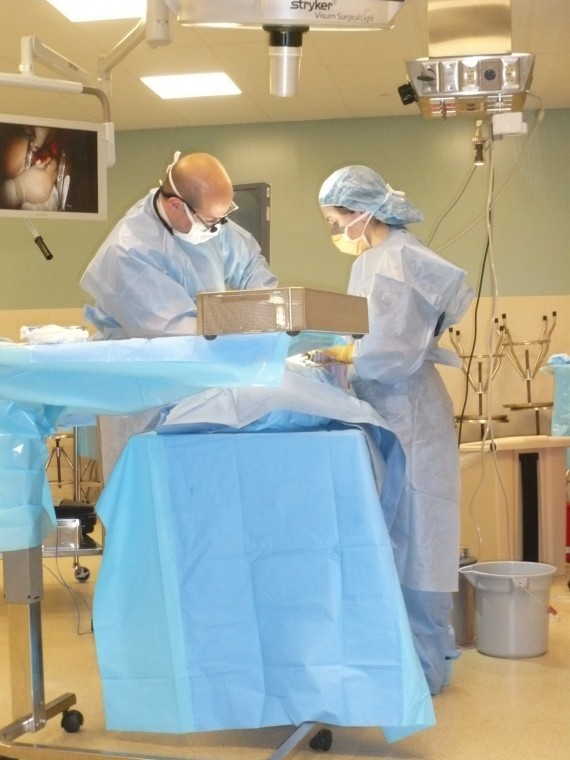It is an odd skill, looking at a person and knowing how long they would take to defrost.
Michael Sheehan’s job depends on it.
As director of North Shore-LIJ’s Bioskills Education Center, the former construction worker runs an $8 million facility where doctors learn new procedures and medical students gain hands on experience – operating on cadavers.
“Normally hospitals don’t have something this size,” Sheehan said. “The bioskills facility will be maybe a room near the morgue with a table. This is really an anomaly.”
The original home of the United Nations, the Bioskills Education Center is sited in a former defense manufacturing plant, next to LA Fitness and Cablevision’s public access studio in the Village of Lake Success.
At the end of a long hallway lined with medical tools and human bone models lies a waiting area. Plush leather chairs overlook a flat screen TV featuring open heart surgery on the day’s victim: a 38-year-old woman who lost the fight against breast cancer.
Since her arrival, she has undergone a hysterectomy, spine procedure and laproscopic surgery.
“Obviously if you take it out five, six times it gets a little gamey like every meat,” Sheehan said. “But we’ll use it as much as we can.”
Thawing out a cadaver is more art than science. After a few months on the job, Sheehan developed a feel for it. The thaw room is generally kept at ambient temperature, but the thermostat can be manipulated if a cadaver is warming too quickly.
“All the tissue agents we use here are fresh frozen,” he said. “It’s exactly the same feel as live. The only difference is no blood flow.”
Until the early 1990s, Sheehan was installing steel beams for elevator shafts. A layoff made him decide to change he life.
After earning his bachelor’s degree, a job teaching nurses and surgical technicians how to run an operating room led to a job at the bioskills facility at the Hospital for Special Surgery in Manhattan.
“You know what is great about cadavers rather than simulators?” Sheehan asked. “Everything is a little bit different.”
The day’s cadaver is a headless, limbless torso laid out on the operating table.
In scrubs, gloves, and mask is Touro College medical student Ayelet Mottaheden, helping Supervising Physician Assistant John Sobel perform open heart surgery.
“I get to do more hands on in a low pressure environment, because obviously I can’t hurt this patient,” Mottaheden said. “I always see them crack the chest, but here I got to use the saw.”
She was not the only person acquiring new skills at the Center.
A conference sponsored by medical company DeLegge Medical saw 25 physicians operating on USDA certified pig stomachs to learn procedures to treat Barrett’s esophagus, a precursor to cancer.
The Center hosts more than 200 events each year, most of which are sponsored by medical companies.
Still, the lab is not a big money maker.
“It’s very costly to run,” Sheehan said. “I tell everyone, why build one? Use ours.”
Doctors with very rare cases have used the Bioskills facility to practice a surgery before performing it on their patient.
“I have the best staff in the world,” he said. “I have loved educating and working here.”



